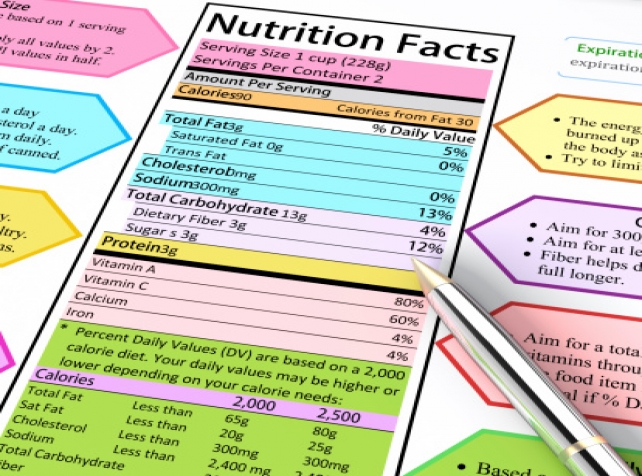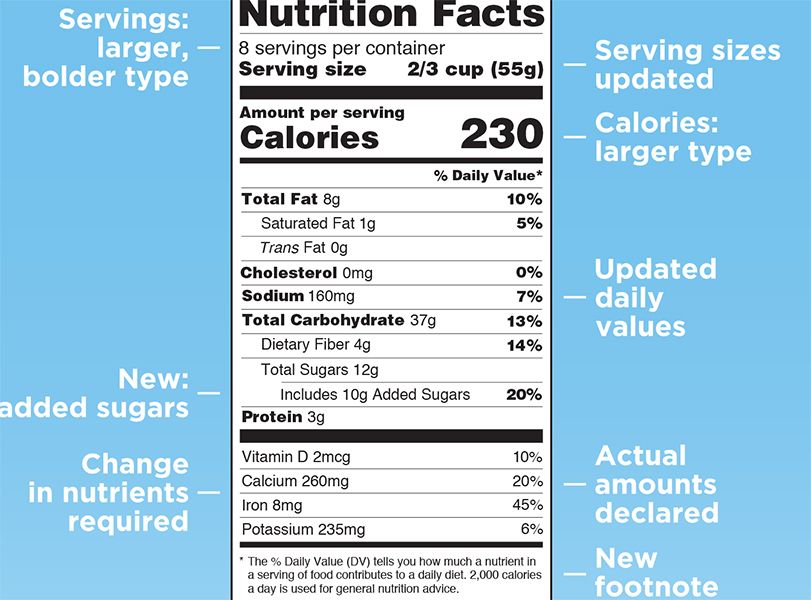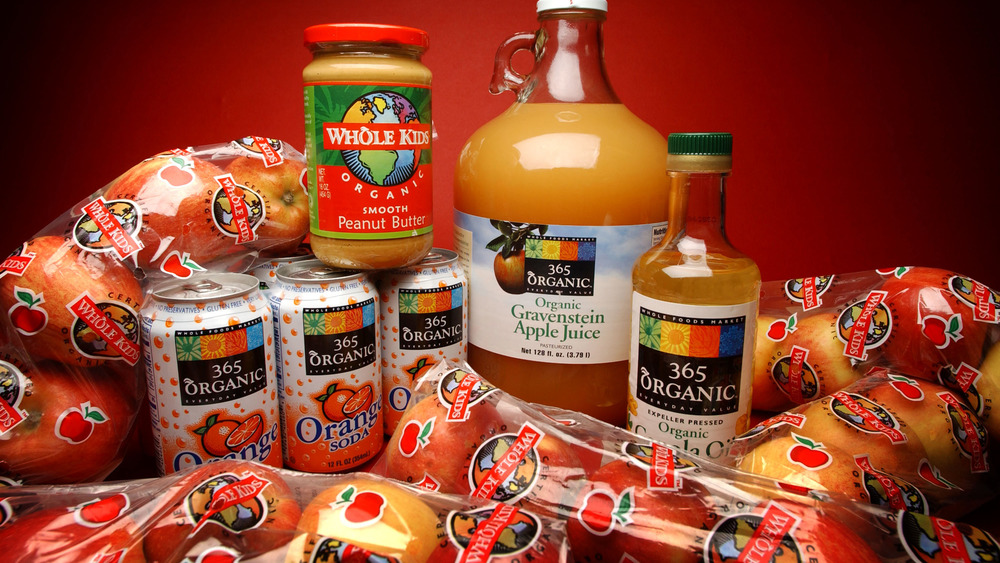40 understanding sugar content food labels
Understanding food labels - Action on Sugar Checking food labels allows you to compare brands, varieties and flavours of products and choose those that are lower in sugars. Adding up the amount of sugars in the products you eat throughout the day will give you an idea of the amount of sugars you are eating. Foods low in sugars have less than 5.0g /100g What to Know About Sugars on the Nutrition Facts Label The new FDA Nutrition Facts label presents information about sugars in two ways that are different from the original label. First, the amount of sugar found in one serving of a product is now displayed as "Total Sugars." This information was previously displayed on the original label as "Sugars."
Helping Kids Learn About Food Labels | Sanford Fit Nutrition labels give information. When you are choosing snacks and drinks, look at the sugar line. It will tell you about the natural and added sugars. "Added sugar" is any sugar that was added to the food at some point. Adding sugar to food does not make it more nutritious. Snacks and drinks without added sugars give you a bonus!

Understanding sugar content food labels
Consumer understanding of sugars claims on food and drink products Food Standards Agency. 2007. Review and analysis of current literature on consumer understanding of nutrition and health claims made on food. London. Grunert KG, Wills JM. A review of European research on consumer response to nutrition information on food labels. Journal of Public Health. 2007; 25:385-99. [Google Scholar] IGD. 2010. Understanding Food Nutrition Labels | American Heart Association Learn what to look for on the label. 1 - Start with the serving information at the top. This will tell you the size of a single serving and the total number of servings per container (package). 2 - Next, check total calories per serving and container. Reading Food Labels When You Have Diabetes - WebMD Reduced cholesterol. At least 25% less cholesterol and 2 g or less of saturated fat. Calorie free. Less than 5 calories. Low calorie. 40 calories or less. Light or lite. 1/3 fewer calories or 50% ...
Understanding sugar content food labels. Added Sugars on the New Nutrition Facts Label | FDA How to read nutrition labels | safefood Some labels use colour coding to show at a glance if a food is high, medium or low in fat, saturated fat, sugar and salt. Low (green) - the best choice. Medium (amber) - okay most of the time. High (red) - only choose occasionally. If the label isn't colour coded, use our label decoder as a guide. Reading Food Labels | ADA - American Diabetes Association The Nutrition Facts labels on foods are really the key to making the best choices. We'll cover the basics so that these labels make shopping easier for you. Get started Understanding Carbs You've heard it all. From carb-free to low-carb, to whole and empty carbs, it's hard to know what it all means. Learn more Food & Blood Sugar Learning To Read Labels - Diabetes Education Online On a nutrition food label, subtract the fiber from the total carbohydrate amount. When you read food labels, the grams of sugar are already included in the total carbohydrate amount, so you do not need to count this sugar amount separately. The grams of sugar listed include both natural sugars, from fruit or milk, and added sugars.
Food Labels | CDC All the numbers on this label are for a 2/3-cup serving. This package has 8 servings. If you eat the whole thing, you are eating 8 times the amount of calories, carbs, fat, etc., shown on the label. Total Carbohydrate shows you types of carbs in the food, including sugar and fiber. Choose foods with more fiber, vitamins, and minerals. Food labelling - Making Sense of Sugar This label will have a traffic light colour overlaid on top of the nutritional information to indicate at a glance whether the food or drink contains a high (red), medium (amber) or low (green) amount of fat, saturates, sugars and salt. Identifying 'added sugars' Understanding food labels - Blood Pressure UK A healthy blood pressure starts with a healthy shopping trolley. Check the labels for salt, saturated fat and sugar to look after your weight, your blood pressure and your heart. For controlling your blood pressure, salt is especially important, so go for as many green lights for salt as possible and aim to eat no more than 6g a day. Food Labels and Fighting Sugar Addiction - dummies 140 mg or less of sodium. Very low sodium. 35 mg or less of sodium. Sugar free. Less than 1/2 gram of sugar. Good source of fiber. 2.5 grams or more of fiber. Lean (meat, poultry, and seafood) Less than 10 grams of total fat, 4.5 grams of saturated fat, and 95 mg cholesterol.
How to Understand and Use the Nutrition Facts Label | FDA Added Sugars on the Nutrition Facts label include sugars that are added during the processing of foods (such as sucrose or dextrose), foods packaged as sweeteners (such as table sugar), sugars from... Nutrition Labeling - The Sugar Association the goal of the food and drug administration's (fda) nutrition fact label is to "ensure consumers have access to the information they need to make informed decisions about the foods they eat." 1 all nutrition facts labels are required to include an added sugars declaration beginning january 1, 2020 for manufacturers with >$10 million in sales and … Understanding sugar content on food labels - Diabetes Care Community Understanding sugar content on food labels is important, to ensure that you're consuming healthy amounts. Reading the ingredient lists and nutrition facts tables on packaged foods is a helpful way for you to check what kind, and how much, sugar a product has. Finding sugar content in the ingredients list Understanding food labels fact sheet - NDSS Understanding how to read food labels can help you choose foods with more fibre and less saturated fat, salt (sodium), added sugars and kilojoules. Food labels will typically include a nutrition information panel, list of ingredients, the 'use by' or 'best before' date and identify potential food allergens and additives. Food labels ...
Understanding food labels | Diabetes UK The labels show how many calories are in the food or drink and are also colour coded to show whether the food is low (green), medium (amber) or high (red) in fat, saturated fat, sugar and salt. The information on the front of the pack also tells you how the portion of the food contributes to the Reference Intake (RI) of an adult.
![Making Sense of Added Sugars Labeling [INFOGRAPHIC] – Food Insight | Nutrition facts label, Food ...](https://i.pinimg.com/originals/d2/dc/ce/d2dccec70246798ee6f07b3d838892cf.jpg)
Making Sense of Added Sugars Labeling [INFOGRAPHIC] – Food Insight | Nutrition facts label, Food ...
How to Read Food Labels and Understand Sugar Content - yum. Gluten Free Agave, brown rice syrup, brown sugar, cane sugar, caster sugar, coconut nectar, coconut sugar, dextrose, fructose, fruit juice concentrate, glucose, glucose syrup, golden syrup, honey, icing sugar, invert sugar, maple syrup, molasses, panela, rapadura sugar, raw sugar, rice malt syrup, sucrose (They're all types of added sugar!) 'No added sugar'
How To Read Food labels for Sugar | My Sugar Free Kitchen On the label check the sugars in the nutrition panel. 5g/ml or less of sugar per 100g/ml = this would count as low sugar content. It means 5% of the ingredients are sugar Between 5g/ml and 20g/ml of sugar per 100 grams = medium sugar content. With 20ml of sugar per 100 ml, this means the product is 20% sugar…not so good.
Helping Kids Learn About Food Labels | Sanford Fit The lessons in this unit present a fun and interactive way to learn about sugar content in snacks and drinks. Kids will increase their decision-making skills as they learn how to read a food label to tell if an item contains excessive amounts of sugar. ... Read about the new nutrition labels: Understanding Food Nutrition Labels; Play Food Bingo ...

Another good image for some hidden sugar. Most people don't check the labels, thus making their ...
Reading food labels: Tips if you have diabetes - Mayo Clinic A sugar-free label means that one serving has less than 0.5 grams of sugar. When you're choosing between standard products and their sugar-free counterparts, compare the food labels. If the sugar-free product has noticeably fewer carbohydrates, the sugar-free product might be the better choice.
Decoding Food Labels: Sugar Labeling and What It Means - Lakanto The most up-to-date Nutrition Facts labeling guidelines include information on whether the sugar content of the food you are consuming or purchasing is low or high. Low sugar. 5% daily value (DV) or less is a considered a low source of added sugars High sugar. 20% DV or more is a high source of added sugars
Food labelling - Making Sense of Sugar - UK light colour overlaid on top of the nutritional information to indicate at a glance whether the food or drink contains a high (red), medium (amber) or low (green) amount of fat, saturates, sugars and salt. For traffic-light labels you will find different limits for total sugars depending on whether the product is a food

(PDF) Influence of sugar label formats on consumer understanding and amount of sugar in food ...
How to Read Food Labels Without Being Tricked - Healthline The product may contain very little whole grains. Check the ingredients list — if whole grains aren't in the first three ingredients, the amount is negligible. Fortified or enriched. This ...
Sugars: Using the food labels - Canada.ca Sugar-based ingredients added to prepackaged foods appear in the list of ingredients: in brackets after the name 'sugars'. in descending order based on weight. This will help you: see that sugars have been added to the food. understand how much sugars are added to the food compared to other ingredients. List of ingredients - Text description.
Understanding Food Labels | The Nutrition Source | Harvard T.H. Chan ... Plain dairy milk will show 12 grams of Total Sugars (naturally occurring from lactose) per cup but zero Added Sugars. A cup of strawberry yogurt may show 20 grams of Total Sugars of which 10 grams are Added Sugars (10 grams are naturally occurring from lactose and the other 10 grams are from an added sweetener).
Reading Food Labels When You Have Diabetes - WebMD Reduced cholesterol. At least 25% less cholesterol and 2 g or less of saturated fat. Calorie free. Less than 5 calories. Low calorie. 40 calories or less. Light or lite. 1/3 fewer calories or 50% ...
Understanding Food Nutrition Labels | American Heart Association Learn what to look for on the label. 1 - Start with the serving information at the top. This will tell you the size of a single serving and the total number of servings per container (package). 2 - Next, check total calories per serving and container.
Consumer understanding of sugars claims on food and drink products Food Standards Agency. 2007. Review and analysis of current literature on consumer understanding of nutrition and health claims made on food. London. Grunert KG, Wills JM. A review of European research on consumer response to nutrition information on food labels. Journal of Public Health. 2007; 25:385-99. [Google Scholar] IGD. 2010.







Post a Comment for "40 understanding sugar content food labels"